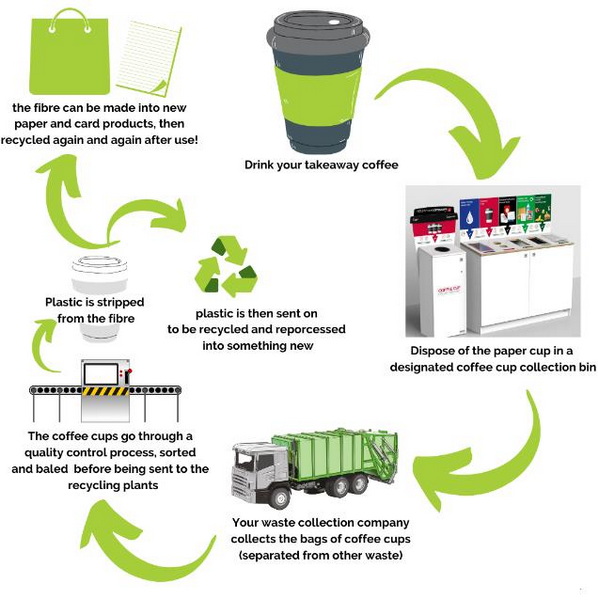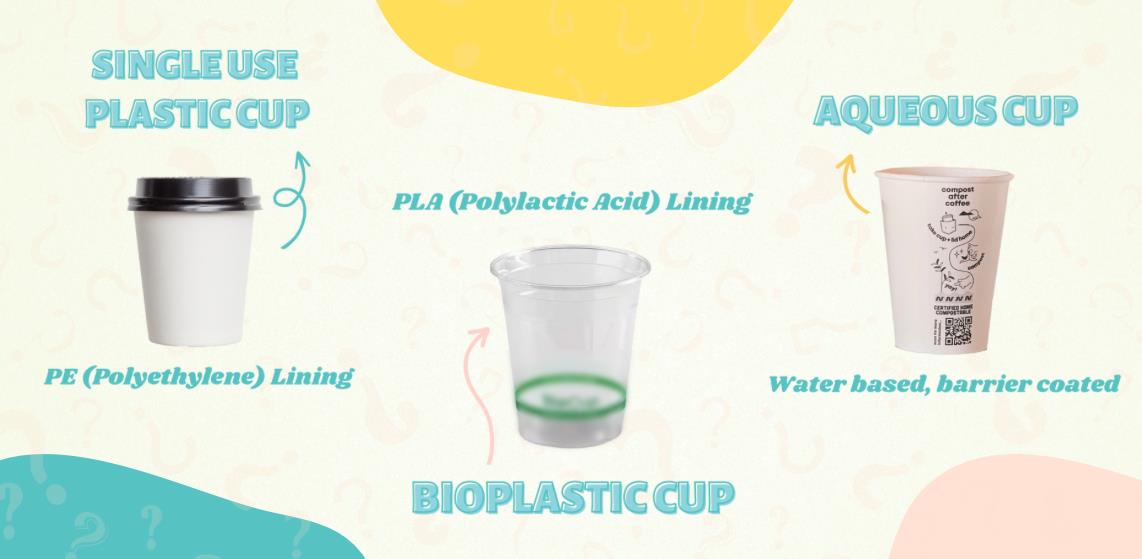
Content Menu
● The Composition of Disposable Coffee Cups
● Why Most Disposable Coffee Cups Can't Be Recycled
● The Environmental Impact of Disposable Coffee Cups
● Alternatives to Disposable Coffee Cups
>> 1. Reusable Coffee Cups
>> 2. Compostable Cups
>> 3. Supporting Sustainable Cafés
● How Are Disposable Coffee Cups Recycled?
● Conclusion
● FAQ
>> 1. Can all paper coffee cups be recycled?
>> 2. What happens to disposable coffee cups when they end up in landfills?
>> 3. Are there any companies successfully recycling disposable coffee cups?
>> 4. What are some sustainable alternatives to disposable coffee cups?
>> 5. How can I ensure my used coffee cup is recycled properly?
● Citations:
In today's fast-paced world, disposable coffee cups have become a staple for many coffee drinkers. However, the environmental impact of these cups is significant, raising questions about their recyclability. This article delves into the complexities surrounding the recycling of disposable coffee cups, examining why they are often not recyclable, the alternatives available, and what consumers can do to mitigate their environmental footprint.

The Composition of Disposable Coffee Cups
Disposable coffee cups are primarily made from paper, but they also contain a thin lining of plastic, typically polyethylene. This lining is essential for preventing leaks and maintaining the structural integrity of the cup when filled with hot liquids. Unfortunately, this plastic component complicates the recycling process.
- Material Breakdown: About 90-95% of a disposable coffee cup is paper, while 5-10% is polyethylene.
- Recycling Challenges: The presence of plastic makes it difficult for traditional paper recycling facilities to process these cups. Most paper mills are not equipped to separate the plastic from the paper fibers effectively.
Why Most Disposable Coffee Cups Can't Be Recycled
Despite being labeled as recyclable, a staggering 99.75% of disposable coffee cups end up in landfills. The reasons for this include:
1. Plastic Lining: The polyethylene lining prevents the cups from being processed in standard recycling streams.
2. Contamination Issues: Many recycling facilities reject items that are contaminated with food or liquid, which is common with used coffee cups.
3. Limited Recycling Infrastructure: Although some mills can recycle these cups, they are few and far between, leading to logistical challenges in collection and processing.
4. Consumer Misconceptions: Many consumers mistakenly believe that all disposable coffee cups can be recycled simply because they carry a recycling symbol.

The Environmental Impact of Disposable Coffee Cups
The environmental consequences of disposable coffee cups extend beyond just their inability to be recycled. When disposed of in landfills, these cups contribute to several pressing issues:
- Microplastic Pollution: As disposable cups break down, they release microplastics into the environment, which can enter food chains and harm wildlife.
- Resource Waste: The production of disposable cups consumes valuable resources, including water and energy, contributing to deforestation and carbon emissions.
- Landfill Overflow: With billions of cups discarded each year globally, landfills are rapidly filling up with non-biodegradable waste.
Alternatives to Disposable Coffee Cups
Given the challenges associated with recycling disposable coffee cups, consumers are encouraged to consider more sustainable alternatives:
1. Reusable Coffee Cups
Investing in a high-quality reusable coffee cup is one of the best ways to reduce your environmental impact. These cups are often made from materials like stainless steel or glass and can be used repeatedly without contributing to waste.
2. Compostable Cups
Some companies have started producing compostable coffee cups made from plant-based materials. However, it's essential to check local composting facilities to ensure they accept these types of cups.
3. Supporting Sustainable Cafés
Choose cafés that encourage the use of reusable containers or participate in cup-sharing programs. Many establishments offer discounts for customers who bring their own cups.
How Are Disposable Coffee Cups Recycled?
For those interested in how recycling works for disposable coffee cups, here's a brief overview:
1. Collection: Used coffee cups are collected separately from other recyclables to prevent contamination.
2. Pulping Process: In specialized facilities like those operated by James Cropper, the collected cups are fed into a large pulper—a machine that resembles a giant blender—where warm water and chemicals help break down the materials.
3. Separation: During pulping, the plastic lining separates from the paper fibers. The fibers can then be processed into new paper products while the plastic is often discarded or incinerated.
4. End Products: The recycled paper fibers can be turned into various products such as packaging materials or tissue paper.
Conclusion
The issue of recycling disposable coffee cups highlights a significant gap in our waste management systems and consumer awareness. While it may seem convenient to grab a cup of coffee on-the-go, it's crucial to recognize the environmental implications associated with single-use products. By opting for reusable alternatives and supporting sustainable practices at local cafés, consumers can play an essential role in reducing waste and promoting a healthier planet.

FAQ
1. Can all paper coffee cups be recycled?
No, most paper coffee cups cannot be recycled due to their plastic lining which complicates the recycling process.
2. What happens to disposable coffee cups when they end up in landfills?
They can take decades to decompose and contribute to microplastic pollution as they break down.
3. Are there any companies successfully recycling disposable coffee cups?
Yes, some companies like James Cropper have developed processes to recycle plastic-lined disposable coffee cups into new products.
4. What are some sustainable alternatives to disposable coffee cups?
Reusable coffee mugs and compostable cups made from plant-based materials are excellent alternatives.
5. How can I ensure my used coffee cup is recycled properly?
Look for specialized recycling programs in your area or return your cup to cafés that have dedicated recycling initiatives.
Citations:
[1] https://www.thecommons.earth/blog/why-99-75-of-paper-coffee-cups-cant-be-recycled
[2] https://mtpak.coffee/2024/02/disposable-coffee-cups-recycling-process/
[3] https://envirocenter.org/why-arent-paper-cups-recyclable-or-compostable-if-they-are-made-from-paper/
[4] https://www.istockphoto.com/de/bot-wall?returnUrl=%2Fde%2Fphotos%2Fcoffee-cups-trash
[5] https://www.youtube.com/watch?v=AdmqKQOc-0I
[6] https://wasteadvantagemag.com/new-infographic-reveals-the-waste-mountain-of-coffee-cups-we-produce-per-year/
[7] https://www.afandpa.org/news/2022/are-paper-cups-recyclable
[8] https://earth911.com/recycling-guide/how-to-recycle-paper-cups/
[9] https://www.reddit.com/r/Portland/comments/1csd8z7/recycling_singleuse_iced_coffee_cups/
[10] https://www.youtube.com/watch?v=iwJr7q2r5Xo

















